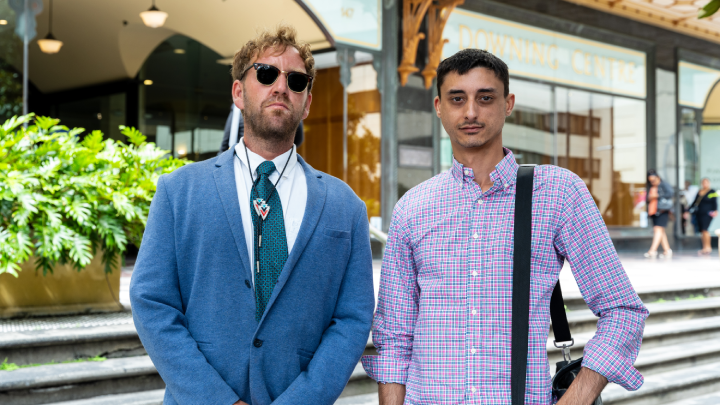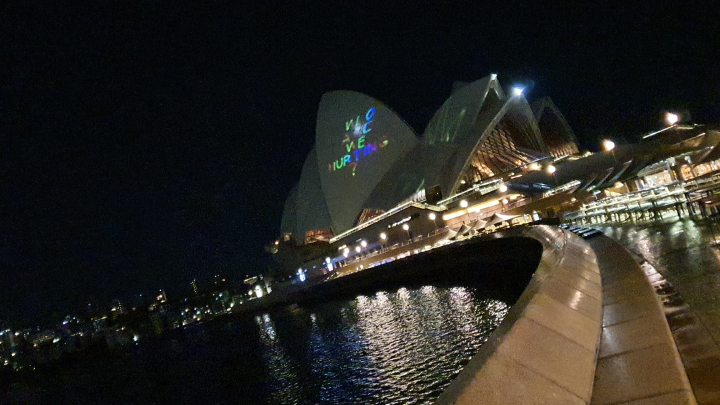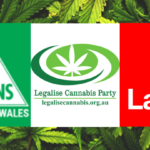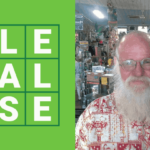“We Won the Battle But the War Continues”: Opera House Cannabis Activists Zammitt and Stolk on Their Day in Court

For almost a decade now, cannabis activists Alec Zammitt and Will Stolk have been brightening the Sydney scene with their elaborate protest actions that employ guerilla theatre tactics to agitate for the legalisation and regulation of cannabis in this country.
Part of the “Who Are We Hurting?” campaign, the pair were behind the publicity stunt that projected pro-weed imagery, such as dancing cannabis leaves, onto the Sydney Opera House and the Harbour Bridge on the 20 April last year, which is 4/20: the day the herb is celebrated globally.
Whilst the prank was frankly a crack up, New South Wales police officers raided the hotel suite where the pair were projecting the images from. And they were then charged with distributing advertising on Opera House premises, contrary to section 9(g) of the Sydney Opera House Trust By-Law 2021 (NSW).
And on Tuesday, the pair appeared at Sydney’s Downing Centre Local Court, facing a charge that carries a $1,100 fine, and after much deliberation, Magistrate Daniel Reiss ruled the prosecution’s evidence inadmissible, and he gave them a two week extension to find some that actually sticks.
Legalise it. Don’t criticise it
Zammitt and Stolk have spent the last 16 months on bail for having a sense of humour, along with being passionate about the legalisation of the fairly innocuous plant and actively doing something interesting about it. A little over 10 percent of the entire nation regularly uses pot annually.
Right now, in NSW, an individual can be charged, at a police officer’s discretion, with personal possession and face up to 2 years inside, while in the ACT, it’s been legal to possess a personal amount of the drug and grow a couple of plants at home since 31 January 2020.
In the United States, the nation that propagated the “reefer madness” myth of the 1930s, 22 states and the capital have legalised cannabis use. And since the first retail sale in Colorado on 1 January 2014, it’s become a multibillion-dollar industry that channels millions in tax into the social sector.
The entire nations of Canada, Uruguay, Thailand and Malta have legalised the plant. And in the countries of Mexico and South Africa, the highest courts in the land ruled that criminalising the private adult use and homegrow of cannabis to be against basic rights and legalised the practice.
Top brass pursues dynamic duo
Sydney Criminal Lawyers senior associate James Clements represented the pair of merry pranksters on 29 August 2023. And the lawyer questions why such a high-ranking NSW police officer, chief inspector Gary Coffey, was even involved in a case regarding a fine-only offence.
Clements required Coffey to be present in the courtroom on the day for proceedings, and NSW police threatened the law firm with an application of costs for his presence. SCL responded that if you don’t want such a high-ranking officer to attend, then don’t have them bring the charges.
Cannabis activists Alec Zammitt and Will Stolk spoke to Sydney Criminal Lawyers about why they use such costly and colourful tactics to make their point, the type of legalisation model they want to see established in Australia and the new pro-cannabis breed of politician springing up nationwide.

Alec and Will, you two appeared in the Downing Centre Local Court yesterday, charged over having projected cannabis leaves and other forms of pro-cannabis imagery onto the Sydney Opera House on 4/20 last year.
The protest action you’ve been charged over harmed no one. In fact, it was quite humorous.
So, what sort of charges does one receive for a nonviolent prank like that? And how did yesterday’s hearing go?
Zammitt: We won the battle, but the war continues. Basically, we spent yesterday deliberating over whether the evidence that they had built the case around could be used against us or if it would be made inadmissible.
And come the end of the day, the judge decided that it was inadmissible and the evidence that the whole case was built around couldn’t be used against us.
The prosecution has requested an extension of another two weeks in order to try and gather new evidence, which obviously they haven’t already done in the past 16 months.
The offence is fine-only, but it would still appear on our record if we’re found guilty. The actual charge was distribution of advertisement on Opera House premises.
Based on the case yesterday, I feel it went really well. I consider it a win. But obviously, the war is not over, and we still have future dates to attend.

You two have been staging these publicity stunts for almost a decade. You recently drove tanks over the Harbour Bridge with now NSW Legalise Cannabis MLC Jeremy Buckingham, whilst you were on bail, and you once set up a gigantic cannabis Christmas tree in Martin Place.
These are costly ventures. Why stage these elaborate actions? Why not just hold a protest march? What’s your theory behind the stunts?
Zammitt: Traditional protests have their merits. But we try to approach things from the background that we know, as artists, which initially drew us to conduct this style of action or protest.
I feel it resonates with the public. We aren’t imposing on anyone. And it’s just leveraging our own skills to a cause that we feel strongly and are passionate about. Opera
We are not encouraging people to take cannabis up or start smoking. We just want to alleviate the stresses that are caused by the laws.
The biggest downsides to consuming are legislation-based. Those laws can affect someone throughout the rest of their lives, while consuming some cannabis may only affect them for a short period of time.
Stolk: Protest marches don’t have the same epic impact. The whole reason that we do what we do is that we want to get people talking about change.
If you look at what has changed over the last eight years that we have been doing these stunts, you can see that the general kind of take on what cannabis is has evolved in Australia. It is a lot more mainstream and accepted.
We do it for the thrill and the impact that it makes. We like to make people laugh. We like to make people think, and this is a really good and effective way of causing social change.
Word of mouth is underrated.
You’re both part of the “Who Are We Hurting” legalise cannabis campaign, which, due to your efforts, has spread globally. What do you want to see occur in terms of cannabis in this country?
Zammitt: First and foremost, we need the cannabis driving laws fixed as soon as possible. There needs to be a defence similar to what cannabis patients in Tasmania enjoy throughout mainland Australia.
Beyond that, something similar to the bill that David Shoebridge has proposed, in terms of having cannabis cafes and a legal recreational retail market.
We’ve seen throughout the world that’s the way to go. It’s the best thing for our economy. And it’s the best health approach to dealing with cannabis use as a whole.
The models that you see throughout the world now are flourishing and don’t bring any negative backlash or unintended results.
Stolk: We want full recreational legalisation, so that we have the ability to do what we want to do.
If we so choose to smoke weed, it should be treated exactly like cigarettes and alcohol are.
Cannabis causes a lot less harm. Cannabis has never caused any deaths. Alcohol and tobacco kill thousands and thousands of people every year.
We can legally go to the pub and buy a beer. We can legally go down to the servo and buy a packet of cigarettes. But we get objectified and arrested for smoking a plant.
These are ridiculous outdated laws that need to change.
We were in contact when you staged another stunt in 2017. It involved setting up a fake grow house in a shopfront in Kings Cross. The idea of legalising cannabis was a lot different in the public mind back then compared to now.
How would you describe what’s happened over the last six years? And why do you think it’s occurred?
Zammitt: A lot of people have put in a lot of effort to educate the public and bring about awareness. What we do is just one element of that.
We’ve really noticed the stigma change. We now have the public on our side. We don’t get any negative backlash for what we are doing these days.
In the early days, before we had a legal medicinal cannabis market in Australia, especially, like now, where they’re giving scripts to everyone who wants to purchase one, we’ve really seen the stigma change over that time.
I attribute that to education and awareness – just debunking the old incorrect myths.
Stolk: The stigma towards cannabis has greatly changed. The positive movement in places like America, where there are 20-plus recreational states and 30-plus medical marijuana states, has greatly contributed to changing stigma.
Canada federally legalising was a big step forward in showing people that if you do legalise a drug, like cannabis, that there is not anarchy in the streets – people aren’t shooting up heroin on the side of the road, like a lot of people would think.
These positive changes in these countries have shown that Australia is stuck in the Stone Age, and we need it to come forward into the Stoned Age.
Greens Senator David Shoebridge recently introduced the Legalise Cannabis Bill 2023 into federal parliament. And recent state elections have all resulted in Legalise Cannabis Party members being voted into office.
How are you two feeling about the political will to see cannabis legalised in Australia?
Stolk: It’s slowly progressing. It’s fantastic that people, like Jeremy and Brian in WA, David Ettershank, Rachel Payne and Fiona Patten are supporting legalisation.
But in my opinion, while these single policy parties are fantastic, and they’re spearheading the change, in order for full recreational legalisation to happen, one of the big two parties has to jump on board and actually want to see a change.
And the only way that happens is through economics. As David Shoebridge is saying, it’s potentially up to a $28 billion cannabis market for the Australian economy.
That is taking the money away from drug dealers. It is making it safer for people to access for medicine and for the recreational cannabis that they want to use. It lifts the stigma and the dirtiness of going to a black-market dealer.
There is a great change afoot. But the only way to see the change that we want is that one of the large parties gets on board and recognises that this is economically viable and that it will cause a lot of good change in Australia.
So, in having said that, in the Australian Capital Territory, three years ago, the Labor Greens government legalised the personal possession of cannabis, along with legal homegrow with a limit on plants.
You can’t be busted for it there, unless you’re illegally cultivating or selling it. What do you think about that system operating, while you can be arrested for recreational use in the rest of the country?
Stolk: If you look at what I was saying before, that some people think that if cannabis is legalised there will be anarchy in the streets, Canberra is a good example that positive drug change, in a controlled way, can really help people.
Drugs in general need to be treated as a health issue, as opposed to a criminal issue, because over the last 80 years of this war on drugs nothing good has come of it.
Zammitt: In terms of the Canberra model, it is a good model, but there are still a lot of holes even in that one.
It is a great example to show that it is not causing chaos on the streets, but, for example, you can only grow outdoors, and people in apartments or those who don’t have a backyard, don’t have a way to grow.
But with the way that technology is moving, you would really want to bring it indoors and under some lights to get a good viable product all year round.
Separate to that, there are some issues with obtaining seeds under the law. So, really, there’s a blind eye turned, and plants are just meant to pop up in people’s backyards.
With that said, even if you possess seeds, it is still illegal for trade, or amongst anyone whether that be the seed, the plant or the finished product, the bud that comes off it.
So, it’s definitely a good model. But there are still holes in it that need to be fixed.
What Michael Pettersson is doing in his approach to decriminalising drugs in the ACT, which has just come into effect, I feel that’s a better health-based approach, rather than creating criminals out of people that are consuming any form of drug.
We see this decriminalisation health model working in other countries. It works effectively in reducing addiction and other problems that are associated with that.
In terms of getting the other party’s support, I understand it has been put through by Labor in Canberra, but it still seems to be getting voted down in many other states.
But with that said, the politicians are realising that they are asleep at the wheel. It is a bit crazy that they’ve got single party cannabis policy members sitting right by them now.
That really puts emphasis on how many votes they’re losing for having such outdated views.
So, who knows? These single policy parties with a fresh look on life and a different opinion to the usual politicians that we have in office, might even fix things like the housing crisis.







